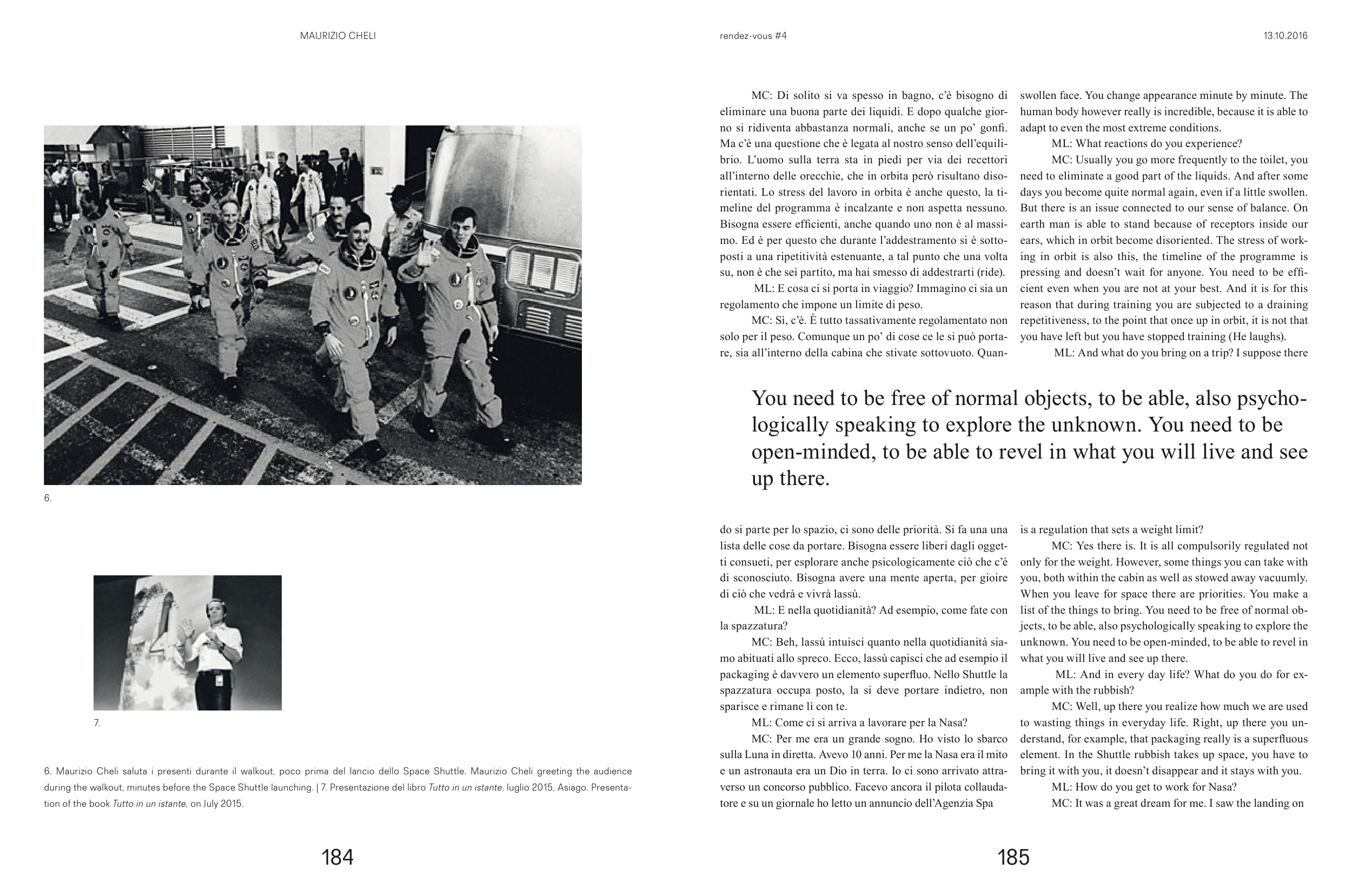184
185
6.
7.
MAURIZIO CHELI
6. Maurizio Cheli saluta i presenti durante il walkout, poco prima del lancio dello Space Shuttle. Maurizio Cheli greeting the audience
during the walkout, minutes before the Space Shuttle launching. | 7. Presentazione del libro Tutto in un istante, luglio 2015, Asiago. Presenta-
tion of the book Tutto in un istante, on July 2015.
MC: Di solito si va spesso in bagno, c’è bisogno di
eliminare una buona parte dei liquidi. E dopo qualche gior-
no si ridiventa abbastanza normali, anche se un po’ gonfi .
Ma c’è una questione che è legata al nostro senso dell’equili-
brio. L’uomo sulla terra sta in piedi per via dei recettori
all’interno delle orecchie, che in orbita però risultano diso-
rientati. Lo stress del lavoro in orbita è anche questo, la ti-
meline del programma è incalzante e non aspetta nessuno.
Bisogna essere effi cienti, anche quando uno non è al massi-
mo. Ed è per questo che durante l’addestramento si è sotto-
posti a una ripetitività estenuante, a tal punto che una volta
su, non è che sei partito, ma hai smesso di addestrarti (ride).
ML: E cosa ci si porta in viaggio? Immagino ci sia un
regolamento che impone un limite di peso.
MC: Sì, c’è. È tutto tassativamente regolamentato non
solo per il peso. Comunque un po’ di cose ce le si può porta-
re, sia all’interno della cabina che stivate sottovuoto. Quan-
swollen face. You change appearance minute by minute. The
human body however really is incredible, because it is able to
adapt to even the most extreme conditions.
ML: What reactions do you experience?
MC: Usually you go more frequently to the toilet, you
need to eliminate a good part of the liquids. And after some
days you become quite normal again, even if a little swollen.
But there is an issue connected to our sense of balance. On
earth man is able to stand because of receptors inside our
ears, which in orbit become disoriented. The stress of work-
ing in orbit is also this, the timeline of the programme is
pressing and doesn’t wait for anyone. You need to be effi -
cient even when you are not at your best. And it is for this
reason that during training you are subjected to a draining
repetitiveness, to the point that once up in orbit, it is not that
you have left but you have stopped training (He laughs).
ML: And what do you bring on a trip? I suppose there
You need to be free of normal objects, to be able, also psycho-
logically speaking to explore the unknown. You need to be
open-minded, to be able to revel in what you will live and see
up there.
do si parte per lo spazio, ci sono delle priorità. Si fa una una
lista delle cose da portare. Bisogna essere liberi dagli ogget-
ti consueti, per esplorare anche psicologicamente ciò che c’è
di sconosciuto. Bisogna avere una mente aperta, per gioire
di ciò che vedrà e vivrà lassù.
ML: E nella quotidianità? Ad esempio, come fate con
la spazzatura?
MC: Beh, lassù intuisci quanto nella quotidianità sia-
mo abituati allo spreco. Ecco, lassù capisci che ad esempio il
packaging è davvero un elemento superfl uo. Nello Shuttle la
spazzatura occupa posto, la si deve portare indietro, non
sparisce e rimane lì con te.
ML: Come ci si arriva a lavorare per la Nasa?
MC: Per me era un grande sogno. Ho visto lo sbarco
sulla Luna in diretta. Avevo 10 anni. Per me la Nasa era il mito
e un astronauta era un Dio in terra. Io ci sono arrivato attra-
verso un concorso pubblico. Facevo ancora il pilota collauda-
tore e su un giornale ho letto un annuncio dell’Agenzia Spa
is a regulation that sets a weight limit?
MC: Yes there is. It is all compulsorily regulated not
only for the weight. However, some things you can take with
you, both within the cabin as well as stowed away vacuumly.
When you leave for space there are priorities. You make a
list of the things to bring. You need to be free of normal ob-
jects, to be able, also psychologically speaking to explore the
unknown. You need to be open-minded, to be able to revel in
what you will live and see up there.
ML: And in every day life? What do you do for ex-
ample with the rubbish?
MC: Well, up there you realize how much we are used
to wasting things in everyday life. Right, up there you un-
derstand, for example, that packaging really is a superfl uous
element. In the Shuttle rubbish takes up space, you have to
bring it with you, it doesn’t disappear and it stays with you.
ML: How do you get to work for Nasa?
MC: It was a great dream for me. I saw the landing on
13.10.2016
rendez-vous Δ4


